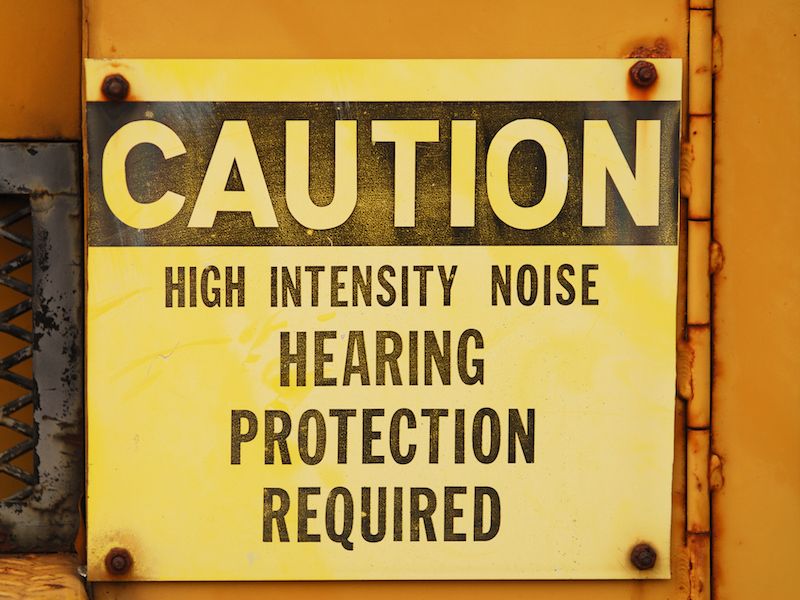It’s one thing to know that you need to protect your hearing. Knowing when to protect your ears is another matter. It’s more difficult than, let’s say, knowing when you need sunscreen. (Is it sunny and are you going to be outdoors? Then you need sunscreen.) It’s not even as easy as knowing when to use eye protection (Doing some hammering? Cutting some wood or working with dangerous chemicals? Use eye protection).
It can feel like there’s a huge grey area when dealing with when to use ear protection, and that can be risky. Usually, we’ll defer to our natural inclination to avoid hearing protection unless we’re given information that a specified place or activity is dangerous.
Risk Assessments
In general, we’re not very good at assessing risk, especially when it comes to something as intangible as injury to the ears or the probability of lasting sensorineural hearing loss. To demonstrate the situation, here are some examples:
- Person A attends a very loud rock concert. 3 hours is around the length of the concert.
- Person B owns a landscaping company. She spends a significant amount of time mowing lawns, then goes home to a quiet house and reads.
- Person C works in an office.
You may presume that person A (let’s call her Ann, to be a little less formal) might be in more hearing danger. For the majority of the next day, her ears will still be screeching from the loud concert. It seems rational to presume that Ann’s recreation was very risky.
Person B (let’s just call her Betty), on the other hand, is subjected to less noise. Her ears don’t ring. So her ears must be less hazardous, right? Well, not exactly. Because Betty is mowing every day. So even though her ears don’t ring out with pain, the injury builds up little by little. If experienced every day, even moderately loud noise can have a detrimental affect on your ears.
What’s going on with person C (let’s call her Chris) is even more difficult to sort out. Most individuals understand that you need to safeguard your ears while using machines like a lawnmower. But although Chris has a fairly quiet job, her long morning commute on the train each day is rather loud. Additionally, even though she works at her desk all day, she listens to her music through earbuds. Does she need to give some thought to protection?
When is it Time to Worry About Protecting Your Hearing?
The normal guideline is that if you have to raise your voice in order to be heard, your environment is loud enough to do damage to your ears. And you really should consider wearing earmuffs or earplugs if your surroundings are that noisy.
The limit needs to be 85dB if you want to be scientific. Sounds above 85dB have the ability to cause injury over time, so you need to consider using ear protection in those scenarios.
Many hearing professionals recommend getting a specialized app to monitor noise levels so you will be aware when the 85dB has been reached. These apps can show you when the ambient noise is nearing a dangerous level, and you can take suitable steps.
A Few Examples
Even if you do get that app and take it with you, your phone may not be with you wherever you go. So a few examples of when to protect your ears may help you develop a good standard. Here we go:
- Commuting and Driving: Spending all day as an Uber or Lyft driver? Or perhaps you’re just waiting downtown for work or boarding the train. The noise of living in the city is bad enough for your hearing, not to mention the extra injury caused by cranking up your tunes to drown out the city noise.
- Working With Power Tools: You understand that working all day at your factory job is going to call for ear protection. But what if you’re simply working in your garage all day? Even if it’s just a hobby, hearing specialists recommend using hearing protection if you’re working with power equipment.
- Exercise: You know your morning spin class? Or maybe your nighttime Pilates session? You might think about wearing hearing protection to each one. The loud volume from trainers who play loud music and microphones for motivation, though it might be good for your heart rate, can be bad for your hearing.
- Household Chores: We already mentioned how something as basic as mowing the lawn, when done often enough, can require hearing protection. Chores, such as mowing, are most likely something you don’t even think about, but they can result in hearing impairment.
- Listening to music with earbuds. This one calls for caution, more than protection. Whether your music is going directly into your ears, how loud it is playing, and how long you’re listening to it are all things you need to give consideration to. Think about getting headphones that cancel out outside noise so you don’t have to crank up the sound to hazardous levels.
These examples might give you a good baseline. If there is any doubt, though, wear protection. Compared to leaving your ears exposed to future harm, in most situations, it’s better to protect your ears. If you want to be able to hear tomorrow, protect today.

